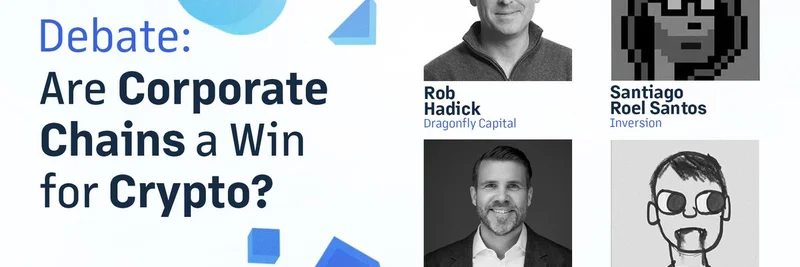Hey crypto enthusiasts, if you're knee-deep in the world of meme tokens like the rest of us at Meme Insider, you've probably wondered how big corporations dipping their toes into blockchain waters might shake things up. Well, a recent tweet from Blockworks' Digital Asset Summit (DAS) has sparked some serious buzz about just that.
The tweet highlights an upcoming debate at DAS London 2025, titled "Are Corporate Chains a Win for Crypto?" Set for October 14, 2025, this panel promises to unpack whether 2025's wave of corporate chain launches benefits the broader ecosystem or just pads corporate pockets. For those new to the term, corporate chains typically refer to blockchain networks built or backed by major companies—think permissioned ledgers for enterprise use, like J.P. Morgan's Kinexys or BNY's on-chain offerings. These aren't your wild-west public blockchains where meme tokens thrive, but more controlled environments aimed at institutional efficiency.
The panel lineup is stacked with heavy hitters: Rob Hadick from Dragonfly Capital, Santiago Roel Santos of Inversion, Andrew Peel from TVL Capital, and David Rodriguez from Blockworks Advisory. These folks bring diverse perspectives—from venture capital bets on crypto startups to advisory roles in the institutional space. The event itself runs from October 13-15 at Old Billingsgate in London, positioning the city as a hub for global finance meets crypto.
Why This Matters for Meme Tokens
Meme tokens, those viral, community-driven assets often launched on chains like Solana or Ethereum, rely on decentralization, low barriers to entry, and hype-fueled liquidity. Corporate chains, on the other hand, could introduce more regulated, efficient infrastructures that attract big money from banks and institutions. Proponents argue this influx of capital could spill over, boosting overall crypto adoption and indirectly pumping meme token markets through increased liquidity and tools like tokenized assets.
But skeptics worry it might centralize power, making crypto feel more like traditional finance and less like the rebellious meme culture we love. For instance, if corporations dominate with their own chains, will meme creators find it harder to launch without jumping through regulatory hoops? Or could integrations, like those hinted in Mastercard's 2025 crypto outlook, unlock new avenues for memes to go mainstream?
The Broader Crypto Context in 2025
This debate comes at a pivotal time. With initiatives like the SEC's Project Crypto and state-issued stablecoins popping up, as seen in Wyoming's recent launch, the lines between corporate and crypto worlds are blurring. Meme tokens could benefit from this legitimacy—imagine institutional traders dabbling in dog-themed coins for fun (or profit). Yet, it raises questions about preserving the fun, decentralized spirit that birthed hits like Dogecoin or newer Solana memes.
If you're planning to attend DAS or just following from afar, this session could drop some gems on navigating the evolving landscape. Check out the original tweet for more hype, and stay tuned to Meme Insider for updates on how these trends play out in the meme token space. What do you think—win or threat? Drop your takes in the comments!


